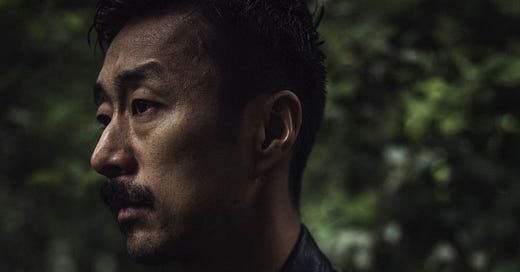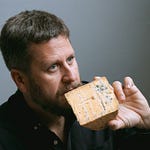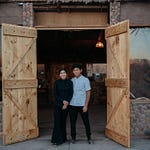Atsushi Tanaka is the Japanese born chef of the restaurant A.T. in Paris, France. Despite being one of the most talented people I know, he has somehow managed to stay off the radar. His restaurant has a Michelin star and he often will go and cook at restaurants around the world, though he doesn’t give a lot of interviews. He’s quiet and elegant rather than in your face and loud, which is refreshing to see, and his food is a reflection of his personality. I was there in Paris last summer and finally had his food after meeting him a couple of years before. It’s a small, minimalist space in the Latin Quarter, a block from Pont de la Tournelle. It’s one of those places I could go again and again. There’s good music playing. The wines, always natural, are beautiful. The food is very ingredient driven, though there aren’t long drawn out stories about anything. It’s not French. It’s not Japanese. It’s not Nordic. It’s not Latin American. It’s just him and he’s a lovely person. It’s my favorite restaurant in Paris.
Also, he breaks the news that he’s probably going to open in New York in the not too distant future. It’s something he has been wanting to do for years and it looks like it will finally happen.
Disclaimer: We talk about cats a lot. We are both cat people. Check out the Instagram of his cats. I think the first 10 minutes of this episode is just two grown men talking about their cats. Don’t judge.
Did you know that you can also listen to the New Worlder podcast on Apple Podcasts, Spotify and most other podcast networks?
Partial Episode Transcript
On Travel
Nick: “Traveling is a big part of your life. Whenever you have like a seasonal break, or a few days off, you go somewhere.”
Atsushi: “Usually we close the restaurant at Christmas. This is for our staff, because for French people it's very important to spend Christmas with family. So that's why we close every year on Christmas season. And then in the summer also, in August. In past the restaurant would close for two or three weeks, so I travel in in August, but I don’t go to Japan because it’s too hot. It's very similar to New York. It's very hot and very humid. Thirty-five or 36 humidity. I don't I don't like it, so that's why I always go to Mexico, Peru or Latin America.”
Nick: “You love Latin America. You have been going there a lot in the last few years.”
Atsushi: “The first time I visited Latin America was in 2016, but before I didn't know anything about it. I went for the first time because Eduardo from Maximo Bistro invited me to cook for Javier’s anniversary. That was the first time I went to Mexico and honestly, I didn’t have a good image of Mexico before. I thought it was like Narcos or drugs or something then I went to Mexico first time and I changed my mind 180 degrees. Totally different. It was very modern. The food was very tasty and there was so much technology. It was so unique and not super hot in Mexico City, for example. Not like Japan in the summer. And then so much goodness. I like the street food. It has a very good street food culture.”
Nick: “It's amazing how good it is. And like the quality of things you get.”
Atsushi: “Also, it's super cheap. One of my favorite restaurants is Los Cocuyos, in the center.”
Nick: “Los Cocuyos. I love it. It's my favorite taqueria.”
Atsushi: “For me, this type of food is better than anything fine dining in Mexico City.”
Nick: “I agree. I think with street food there's a level you can get from just doing the same thing over and over, the same recipe, kind of just perfecting it. But it's not to say every street food vendor gets to that level. For some of them it's an art that's as good as whatever fine dining chef you could ever imagine.”
Atsushi: “I went maybe 10 to 15 times to Mexico was my favorite. It’s my favorite city and I have so many friends there. Then maybe every other year I go to Mexico for vacation. I went many times to cook or to work some event, but now I just go for vacation.”
Nick: “Is it mostly Mexico City? I know we met in Oaxaca though.”
Atsushi: “We met in Oaxaca but I only stayed a few days. The majority of the time I go to Mexico City, but next time I will go to Baja California.”
Nick: “There is a lot in Baja. It's amazing. Everywhere in Mexico is. It's so great.”
Atsushi: “I went to one time to Playa del Carmen.”
Nick: “What did you think about it?”
Atsushi: “Honestly, not my favorite because it's very touristic. It’s not like Oaxaca”
Nick: “But at the same time, even as touristic as a place like that is, there is still like good food around. There's still street food that's really amazing. There are a lot of overpriced touristy restaurants too.” Atsushi: “I went there for the 10-year anniversary of Le Chique. Jonathan invited me to cook there. So that's why I went, and then also went one time to Guadalajara.”
Nick: “I've never been. How was it?”
Atsushi: “It's very nice. They have had so much European immigration…Italian, French, Spanish. And it’s different than Mexico City, but they have so many good restaurants also. And then I went to Oaxaca, but that's it. But whenever I go to Mexico City, I’ll go to Xochimilco. Four or five times. It's very, very interesting.”
Nick: “That's it's a fascinating place. I've only been once. But I love it. I just never have enough time.”
Atsushi: “We went at 5 in the morning at sunrise with Lucho, the chef of Emelia. And one time with Eduardo Garcia, the chef of Maximo Bistro. The next time we are going to cook there. There is a big garden where they grow vegetables for restaurants and sometimes they do pop-ups with different chefs.”
Nick: “You have been to Peru a lot of times too.”
Atsushi: “I went four times. The first time I went to the jungle because I because I wanted to cook a crocodile.”
Nick: “Why a crocodile?”
Atsushi: “Because it’s very interesting. This doesn’t exist in Europe. I never cooked one. And then I made a joke or something and a chef sent me a message. If you want to cook crocodile cxome to Peru and we’ll go to the jungle.”
Nick: “Which chef?”
Atsushi: “Andre Patsias, he was the sous chef of Central.”
Nick: “And you guys went and you actually cooked a caiman, a crocodile?”
Atsushi: “Yes. He invited me to go to the jungle. It was very far away from Lima.
We took a two hour flight and then four hours by car. It was a very dangerous area near the border with Brazil and Peru. I forget the name, but one city was 95 percent gangs. It was where they picked up gold.”
Nick: “The gold miners are quite scary.”
Atsushi: “From this village, we took another car maybe two hours away and then we went to one community with no gas, no electricity, no internet. There were maybe 100 people living there. They eat crocodile one time a week. So, they showed me how to pick up a crocodile and how to cook everything.”
Nick: “How did you cook it?”
Atsushi: “They made crocodile soup with some vegetables, but not any seasoning. No salt. We ate together for one night and we stayed there, and then next day we had a lesson in cooking crocodile. We made pil pil of crocodile. Crocodile has so much collagen. It's like fish. It was very nice. It's a little like fish or like chicken. It’s not like a gamey meat.”
Nick: “It's pretty plain. Like in the US, in like the southern US, there are tons of alligators and stuff and they’re farm raised, but no one ever does anything with it. They just fry it like chicken, like nuggets. I don't know.”
Atsushi: “We ate it raw, like tartar.”
Nick: “In Bolivia, at Gustu they've done that.”
Atsushi: “It’s like chicken. Not a lot of flavor.”
Nick: “It's quite bland.”
Atsushi: “Also, we had a baby crocodile. The meat was very soft and not so complicated to cook, but it's very hard skin. Between the meat and the skin there was so much collagen.”
Nick: “So, when you travel, food is the main thing you're after, but also fashion, music, wine, art.”
Atsushi: “Of course, I travel a lot for learning, that's my passion and I’m always looking for good restaurants. Even super far away. Places like Mil for example. I’m always looking for destination restaurants. That's my objective and my passion. I’ve almost been to all of the destination restaurants in the world, without to Australia and Asia. I always go to Latin America. Peru. Chile. Argentina. Colombia. Brazil. Panama. Mexico.”
Nick: “What about destination restaurants do you like? A restaurant in the middle of nowhere is not what your restaurant is. Your restaurant is in Paris. It's in a very cosmopolitan city.”
Atsushi: “I can’t be a destination restaurant. I’ve always lived in a big city. I’ve never lived in the countryside. Maybe for a few months. In Paris we can get such good products from everywhere. It's not complicated. You know Koks in the Faroe Islands? It's super far away and then it's very cold and cannot grow vegetables. They only use local products. That's why they use so much seafood and very few vegetables. Just parsnips, beetroots, carrots.”
Nick: “It’s like Iceland. Only root vegetables grow.”
Atsushi: “We can't make this type of cooking because it's not same situation. This for me is very interesting.”
Nick: “It’s limitations. You're limited by what you have around you in a place like Faroe Islands or the Amazon or something. That changes the results. It's like if you got to New York, you could get things from everywhere and things start seeming the same I think, sometimes.”
Atsushi: “Maybe we have never had this experience because it is always easy to get good product. And then if we live in the Faroe Islands, of course, we must use only local product. And it's very difficult to change the menu and you have to be very creative. Even if you don't have good product. That's very difficult to do in Paris I think. For me, I enjoy this type of restaurant because we can't have the same experience like in a big city, like New York or Tokyo or Paris or Singapore. So that's why I am always looking for the destination in the world.”
Nick: “They're always different. They're always different from each other as well. Not just different from the city, but it's just because the products are so specialized and localized. It's interesting.”
Atsushi: “Five years ago, I went to Faviken in the middle of nowhere. It was far away from Stockholm. We took a two-hour train and two hours car in February, minus 20. It was very cold.”
Nick: “I only went there once, and it was December I think. And there was just snow everywhere and freezing.”
Atsushi: “But it is already very exciting before you go to the restaurant. Even before you taste something, you know what I mean? So, already we are very happy to be in this situation. And then we are excited because of the concept and the situation.”
Nick: “It does change your mindset when you're traveling to get somewhere to eat.”
Atsushi: “For example, at my restaurant this type of situation and experience is totally different. We can't create this type of experience. Only taste and techniques that you can see, but we can’t create a destination restaurant. It’s opposite from what we are.”
Nick: “But at the at the same time, your food is still a reflection of you, this traveling. I think it's very artistic, there are not a ton of ingredients, but very good ones that are very beautifully prepared and delicious. But it's not like Central or Noma where there's this like grand statement. Or this experience that you're aiming for. And you can't say it's French, Japanese, Nordic, Mexican or whatever. But it's a lot of different ideas that come together.”
Atsushi: “I get many ideas from traveling. For example, I went to Mexico and then back to Paris, but I didn’t make tacos, for example. Then when I went to Peru or when I go to Mexico, when I cook there, I never use products from France. I use always local products in Mexico and Peru. For me that’s very interesting, because when I’m back to Paris I can't make the same things.”
Nick: “You don’t make a ceviche. You could make a ceviche, but you don’t, right?”
Atsushi: “I mean, kind of similar, but not the same, of course.”
Nick: “So it's like the resulting dishes are more a reflection of your life and experience rather than directly doing what you saw somewhere else. It's quieter and I think more elegant. To me, my thoughts after eating at your restaurant last year, it was like you're searching for something. And I say that not like you were searching for something you will never find or anything like that. But it's just the realization that the search is what is important. Does that make sense?”
Atsushi: “Everybody always ask me what type of cuisine do you make?”
Nick: “That’s what I'm saying. It's like there's not a type. You can't define it.”
Atsushi: “I can't say just one. Not French, not Japanese, not Nordic, not Scandinavian. I’m not Spanish. I'm Japanese, but I live in France. For a long time, I used to live in Spain, in Nordic countries, Belgium and I travel a lot everywhere. So honestly, I don't know how to explain it. It's very difficult to explain.”
Nick: “It's just a reflection of you. And I think that's the best thing it could be. I think it works for that reason. And it's like, everyone wants to define things in this little box. But what you do is really undefinable, you know? It's just, it's just you.”
Atsushi: “Maybe I’m unique. People have to come to my restaurant to understand maybe.”
Nick: “I think they do. Lots of people travel and have influences, but what comes out on the plate is not always what you do.”
Atsushi: “For example, I'm Japanese, but I don’t use soy sauce. It’s these types of things. Everything is homemade in my restaurant, so it's very natural also, it's very respectful of the season. In France, it's very easy to get good product all season, all the time. And that's why, I don't know, it’s not complicated to get things compared to Nordic countries. So, we don’t ferment so many things. We do sometimes, but not everything is our intention. And then we always use good products, simply improved or cooked.”
Nick: “Is there a limit how many ingredients you'll put on a plate?”
Atsushi: “Lots of elements. But I mean in one dish, maybe three [ingredients] is the max.”
On his dream to open a restaurant in New York
Atsushi: “I went to maybe thirty times. I went to New York for the first time in 1999, 24 years ago. I went to New York not because of food, but because I love music. So, 90s house and 90s hip-hop is my favorite thing. So that's why I went to New York because I had I was a dancer. That's why I went to New York for dance lessons. And when I went to New York, there was so much energy and so much good vibes.”
Nick: “Would you ever think about like opening a restaurant here?”
Atsushi: “That’s my second dream to open a restaurant in New York. Since a few years ago, I have been looking for a place. We found a place before pandemic on the Lower East Side. But everything was canceled. Then this year, I went a few times. We found a good place in Nolita.”
Nick: “Do you think there's a possibility there?”
Atsushi: “Not 100 percent, but 95 percent. We’re talking architecture, construction, everything. If everything is good maybe we can open next year.”
Nick: “Okay, that's cool. That's exciting.”
Atsushi: “We don't know yet 100 percent, but almost 100 percent. 200 Plus, but almost 1%. But yeah, looking for it.”
Nick: “How will you balance the restaurant in Paris and the cats when you open New York?”
Atsushi: “Of course, I have to go to New York. And then majority of the time I am going to stay in New York. Sometimes I will go back to Paris, but for me, it's very, very big and important to open in New York. So, we're going to make a fine dining counter style restaurant. We're going to make a lounge upstairs and then downstairs a 14-seat counter and four tables. I can’t tell you more information, that’s it.”
Nick: “That is more than I expected to hear to be honest. If you do move to New York and you need a cat sitter, I can watch Hinoki and Tonka.”
Quotes from this interview have been gently edited for context and clarity.














Share this post